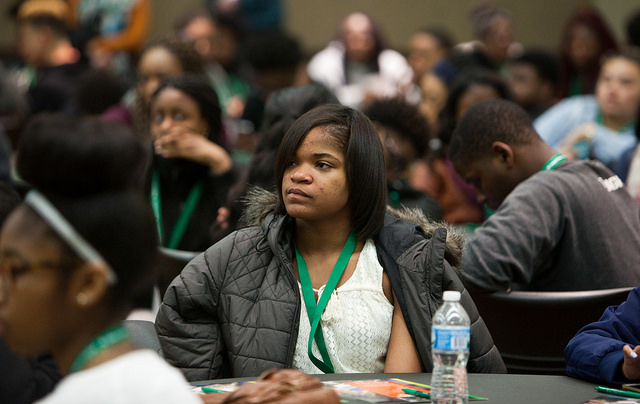
Mindfulness has become an increasingly popular intervention in universities (Barnes et al, 2017). With a growing number attending university, at a stage of their lives in which the onset of mental health issues is more likely (Kessler et al, 2007), there is a greater demand for student mental health services.
Previous research has shown the effectiveness of mindfulness in improving symptoms of common mental health disorders (Goyal et al, 2014) and evidence has suggested that school-based interventions can have a positive effect on wellbeing and reducing stress (Kuyken et al, 2013). However, to date, there has been little robust evidence for the prevention of common mental health issues in university students.
Galante et al.’s recently published randomised controlled trial (the Mindful Student Study) sought to find out whether mindfulness training for university students could increase their resilience to stress.

The number of students accessing university counselling in some services in the UK grew by 50% from 2010 to 2015 (Mair, 2016).
Methods
Study design and participants
This research was a pragmatic randomised controlled trial (RCT) at the University of Cambridge.
Participants were undergraduate or postgraduate students at the university, aged 18 or older. 750 self-selected to take part from a pool of 20,087 students, and 616 students completed the baseline questionnaire. 63% of the participants were female. Students experiencing severe periods of anxiety or depression, a severe mental illness, a recent bereavement or any other serious mental or physical health problem were excluded from the study.
Randomisation
Participants were randomly assigned to receive either:
- an 8-week mindfulness course (Mindfulness Skills for Students – MSS) plus mental health support as usual
or
- mental health support as usual alone
Clearly, trial participants were aware of their group allocation. Of the 616 students who completed the baseline questionnaire, 309 were randomly assigned to the MSS group and 307 to the support as usual group.
Procedures
The MSS intervention was a face-to-face, group-based skills training programme, based on a book ‘Mindfulness: a practical guide to finding peace in a frantic world’ and adapted for university students.
There were up to 30 students on each course, and seven courses ran concurrently during university terms, taught by the same certified mindfulness teacher. Each session lasted 75-90 minutes and students were also encouraged to practise at home. Home practice could vary from meditations to other mindfulness activities such as going for a mindful walk. Cohort 1 started the course in October 2015 and Cohort 2 started in January 2016.
Support as usual consisted of access to support at the university counselling service, as well as support available from the university’s colleges, and from external health services such as the NHS.
Outcomes
Psychological distress was the primary outcome, which was measured with the Clinical Outcomes in Routine Evaluation Outcome Measure (CORE-OM), during the examination period (16 May 2016 to 10 June 2016). There were also prespecified secondary outcomes, such as a measure of altruism based on students’ use of reward vouchers.
The researchers monitored for adverse events and participants with adverse events were offered support.
The primary analysis was by intention to treat.
Results
- 74% (453 out of 616) of students completed the CORE-OM during the examination period
- 59% (182 out of 307) in the MSS group completed at least half of the course
- The distress scores of the MSS participants reduced during the examination period, compared to the scores of those in the support as usual group; the mean CORE-OM score in 237 participants receiving MSS was 0.87 (SD 0.50) compared with 1.11 (SD 0.57) in 216 participants receiving support as usual. This difference showed a moderate effect size
- 57% of students (123 out of 214) in the support as usual group had distress scores above an accepted clinical threshold, compared with 37% (88 out of 235) of participants in the MSS group
- On average, about 6 students had to be offered the MSS course to prevent one from experiencing clinical levels of distress
- Over the year, distress scores in the support as usual group got worse, whereas scores in the MSS group improved after the course and were maintained during examinations
- No participants had adverse reactions related to self-harm, suicidality, or harm to others
- The MSS had a slightly larger effect in women than men.

Participants attending the mindfulness course experienced a reduction in distress in the examination period.
Conclusions
The findings suggest that the MSS course maintains wellbeing and promotes resilience to stress, particularly during the examination period.
The authors concluded that:
Our study suggests that offering openly accessibly mindfulness interventions aimed at the well student population, separate from specific mental health services, is a useful addition to robust clinical interventions delivered by university counselling services.
The 8-week mindfulness course adapted for university students tested in this trial is an acceptable, feasible, and effective component of wider mental health strategies.

Students could benefit from access to a preventative intervention, such as mindfulness.
Strengths and limitations
This is study had a large sample size. Previous RCTs of mindfulness support for university students have had too few students, methodological weaknesses, and no clear primary outcome. Adverse reactions were closely monitored, in contrast to other psychological intervention trials (Duggan et al., 2014; Goyal, 2014).
However, there are limitations to the study. That the participants assessed themselves for inclusion in the trial and for outcomes makes bias likely. The participants, being at the one of the most competitive and academic universities in the world (Cambridge, UK), are also from a specific population, and it is possible they were more conscientious than those at other higher education institutions, suggesting that their commitment to a mindfulness course may be greater than others. Just under half of the participants were postgraduate students, perhaps also indicating a particularly dedicated group. The majority were female and, though the two groups were balanced, this population may have been more likely to practise mindfulness. Additionally, as the authors suggest, volunteers may be more likely to be stressed and seeking help from mindfulness.
Furthermore, as the authors highlight, the participants were not masked to group allocation, and there was no control intervention; the provision of ‘mental health support as usual alone’ would vary. Participants in the support as usual group may also have expected their symptoms to worsen and it was not possible to see how participants’ expectations influenced the results.
A significant number of participants were lost to follow-up at various stages during the trial. Although the authors suggest that this is typical of such interventions, this is likely to have influenced the results.
There was also no measure of what the participants did in their home practice. Given that this is a key component of mindfulness, it would have been interesting to see how much this element contributed to reducing their stress levels.
Implications for practice
Offering mindfulness interventions to students alongside other interventions that promote wellbeing could be a helpful addition to a student mental health strategy, if funding is available. However, further research is needed into trialing mindfulness courses in other higher education institutions with different socio-demographic characteristics, as well as studies into comparing mindfulness to other preventative interventions. Further research will help us to understand if mindfulness can increase resilience to stress or if there are other equally effective interventions.

Exploring the effects of mindfulness at different UK higher education institutions would be worthwhile.
Conflicts of interest
None
Links
Primary paper
Galante J, Dufour G, Vainre M. et al. (2017). A mindfulness-based intervention to increase resilience to stress in university students (the Mindful Student Study): a pragmatic randomised controlled trial. The Lancet Public Health 2018 3(2) e72–e81
Other references
Barnes N, Hattan P, Black DS, Schuman-Olivier Z. (2017) A examination of mindfulness-based programs in US medical schools. Mindfulness 2017 8 489–94. [Abstract]
Duggan C, Parry G, McMurran M, Davidson K, Dennis J. (2014) The recording of adverse events from psychological treatments in clinical trials: evidence from a review of NIHR-funded trials. Trials 2014 15 335–42.
Goyal M, Singh S, Sibinga EMS, et al. (2014) Meditation programs for psychological stress and well-being: a systematic review and meta-analysis. JAMA Intern Med 2014 174 357–68.
Kessler RC, Angermeyer M, Anthony JC, et al. (2007) Lifetime prevalence and age of onset distributions of mental disorders in the World Health Organization’s World Mental Health Survey Initiative. World Psychiatry 2007 6 168–76.
Kuyken, W., Weare, K., Ukoumunne, O. C., Vicary, R., Motton, N., Burnett, R., … & Huppert, F. (2013). Effectiveness of the Mindfulness in Schools Programme: non-randomised controlled feasibility study. The British Journal of Psychiatry 2013 203(2) 126-131. [Abstract]
Mair D. (2016) The rise and rise of higher education and therapeutic culture. In: Mair D, ed. Short-term counselling in higher education: context, theory and practice. Abingdon: Routledge, 2016: 7–26.
Photo credits
- Photo by Brooke Cagle on Unsplash
- Photo by Faustin Tuyambaze on Unsplash
- Photo by Brooke Cagle on Unsplash
- Photo by Daniel Monteiro on Unsplash
- COD Newsroom CC BY 2.0

Brilliant study. I will forward this to my daughter who is a Scuence HID.
Such a cool study. I hope to see more research go into proving phenomenons like this over drug use!
seems bad of you to kick this trail. the limitations do not threaten it’s fundamental finding. the number of students subsequently needing treatment for mental illness was 60% lower in the treated group (http://www.thelancet.com/journals/lanpub/article/PIIS2468-2667(17)30231-1/fulltext Supplemental Figure 7);
surely we should roll this intervention out widely, asap?
[…] Link to full article here […]